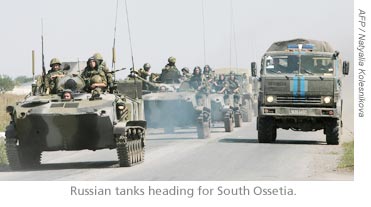Polish television crew detained in South Ossetia
New York, September 8, 2008—South Ossetian and Russian authorities should immediately release three members of a Polish television crew detained today near the village of Karaleti in the buffer zone between South Ossetia and Georgia, the Committee to Protect Journalists said. Authorities confiscated equipment and cell phones from the Telewizja Polska (TVP) crew and were…
Olympics-China Media Watch: Re-education scrubbed from Web, mostly
Bob Dietz called attention to the Chinese propaganda department’s recent 21-point press directive, first reported by the South China Morning Post in Hong Kong. The whole thing in English and Chinese is posted today at Berkeley’s China Digital Times. Among the orders given to the domestic media during the Olympic Games is that they are not to report on…
Turkish journalists fired on in South Ossetia
Journalists came under fire in their car on August 10 near Tskhinvali. According to the Turkish Daily News, Turkish journalist Recep Öztürk was wounded. It is not clear who was shooting at them–the lines have been fluid as the Georgians and Russians battle in South Ossetia. At least three journalists have been killed and 10…
After Fox attack in Georgia, CPJ renews call for protection of journalists
We issued the following statement today in response to the attack on a Fox News crew in Gori, Georgia: “We are troubled that despite the ceasefire, journalists and cameramen have come under fire once again. This is unacceptable and we call on all the parties in the conflict zone to ensure reporters’ safety,” CPJ Executive…
Israeli journalist seriously injured in Gori
New York, August 13, 2008–A veteran reporter with the Tel Aviv-based Hebrew-language daily Yedioth Ahronoth was severely injured on Tuesday in an attack in the central Georgian city of Gori. It was the same attack that killed Dutch cameraman Stan Storimans and injured his RTL Nieuws colleague Jeroen Akkermans.
Growing concern for the fate of journalists in Georgia
At least three reporters have been killed covering the conflict in Georgia, and two others are reported missing. We are investigating reports today that journalists may have targeted at a press center in the city of Gori, which has been flattened in the Russian bombing campaign.
Dutch cameraman killed, reporter wounded in Georgia
New York, August 12, 2008–Stan Storimans, a cameraman with Netherlands-based television channel RTL Nieuws, was killed today during bombing in the central Georgian city of Gori. His colleague, reporter Jeroen Akkermans, suffered shrapnel wounds to his leg and was hospitalized in a Tbilisi clinic, Jaspir Teijsse, a spokesman for RTL Nieuws, told CPJ Storimans was…

Two killed, several injured or missing in South Ossetia
New York, August 11, 2008–Two journalists were reported killed, at least eight were injured, and two have gone missing since fighting erupted between Georgian, Russian, and local forces in the disputed region of South Ossetia. No press-related casualties have been immediately reported in the conflict in another breakaway Georgian region, Abkhazia.
Attacks on the Press 2007: Georgia
GEORGIA Facing a week of massive protests in the capital, Tbilisi, President Mikhail Saakashvili stunned Western allies in November by imposing a state of emergency, banning broadcast news reporting, closing two television stations, and deploying police to forcefully disperse demonstrators. Saakashvili defended the November 7 crackdown, saying that the protests were orchestrated by Moscow with…